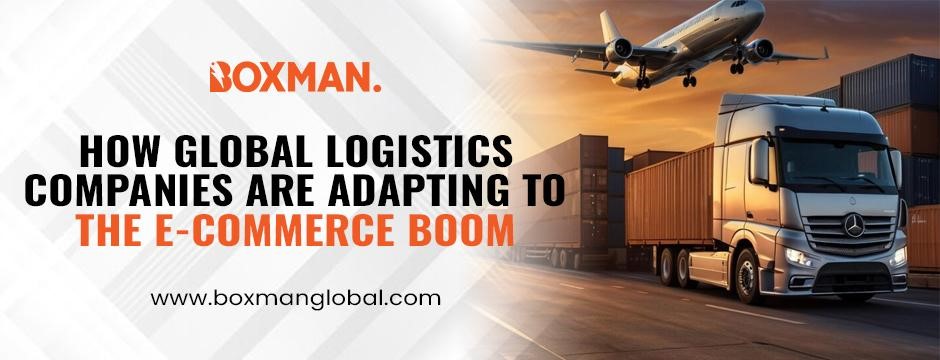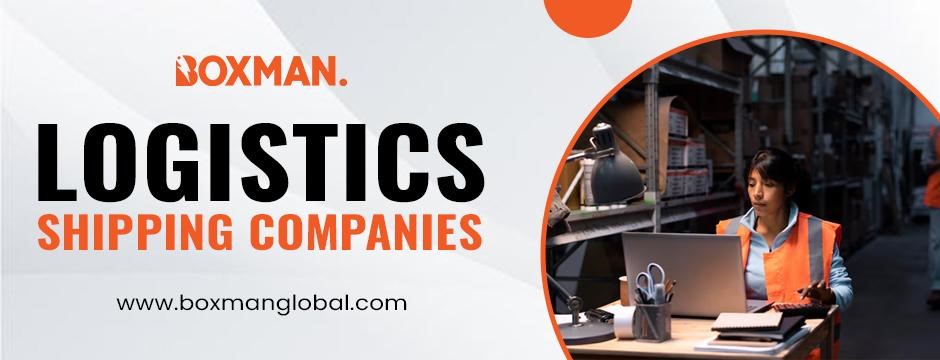
The e-commerce sector has witnessed an unprecedented boom over the past decade, which has only accelerated in recent years. The rapid growth of online shopping has presented opportunities and challenges for global logistics companies, compelling them to rethink and refine their strategies to meet the evolving demands of consumers and businesses alike. In this blog, we’ll explore how global logistics companies like Boxman Global adapt to the e-commerce boom by focusing on critical areas such as warehousing, transportation, and delivery methods. We’ll also discuss the role of technology in this transformation and the importance of sustainability in logistics.
The E-commerce Explosion: A Game Changer for Global Logistics
The rise of e-commerce has revolutionized the retail landscape, changing how consumers shop and businesses operate. The convenience of online shopping, coupled with an increasing number of internet users worldwide, has led to a surge in e-commerce sales. According to a report by eMarketer, global e-commerce sales are projected to reach $6.3 trillion by 2024, up from $4.9 trillion in 2021.
This explosive growth has put immense pressure on global logistics companies to enhance their capabilities to handle the increased volume of orders. Traditional logistics models, primarily designed for B2B transactions, have had to evolve to accommodate the unique demands of B2C and D2C (direct-to-consumer) e-commerce. This shift has led to significant changes in warehousing, transportation, and delivery strategies.
Warehousing: From Storage to Fulfillment Hubs
Warehousing is a critical component of the logistics chain, and the rise of e-commerce has fundamentally changed the way warehouses operate. Historically, warehouses were primarily used for storing goods for long periods before being shipped to retailers or distribution centers. However, the e-commerce boom has transformed warehouses into dynamic fulfillment hubs where speed and efficiency are paramount.
The Role of Technology in Warehousing
Global logistics companies have turned to technology to optimize their warehouse operations to keep up with the high demand for fast and accurate order fulfillment. Automation has become a key enabler in this regard, with technologies such as robotics, artificial intelligence (AI), and the Internet of Things (IoT) playing a pivotal role.
For instance, Boxman Global utilizes AI-driven warehouse management systems (WMS) to streamline operations. These systems can optimize inventory placement, reduce picking times, and minimize errors, resulting in faster order processing and improved accuracy. Additionally, IoT devices help monitor the condition of goods in real time, ensuring that perishable items are stored under the right conditions and reducing the risk of spoilage.
The Rise of Micro-Fulfillment Centers
Another significant trend in warehousing is the rise of micro-fulfillment centers (MFCs). These smaller, strategically located facilities are designed to bring products closer to consumers, enabling faster delivery times. MFCs are particularly useful in densely populated urban areas, where space is limited and demand for same-day or next-day delivery is high.
Transportation: Adapting to the Demands of E-commerce
Transportation is another critical aspect of logistics that the growth of e-commerce has profoundly impacted. The need to deliver millions of parcels to consumers' doorsteps quickly and efficiently has forced logistics companies to rethink their transportation strategies.
The Shift to Multimodal Transportation
To meet the diverse demands of e-commerce, logistics shipping companies are increasingly adopting multimodal transportation solutions. Multimodal transportation involves using multiple modes of transport, such as road, rail, air, and sea, to move goods from one location to another. This approach allows companies to optimize their supply chains by selecting the most cost-effective and efficient modes of transport for each leg of the journey.
The Role of Data Analytics in Transportation
Data analytics plays an increasingly important role in the transportation strategies of global logistics companies. By analyzing data from various sources, companies can gain valuable insights into traffic patterns, fuel consumption, and delivery times. This information can then be used to optimize routes, reduce fuel costs, and improve overall efficiency.
Delivery Methods: Meeting Consumer Expectations
The rise of e-commerce has significantly heightened consumer expectations regarding delivery. In the past, consumers were willing to wait several days or weeks for their orders to arrive. However, the proliferation of e-commerce giants like Amazon has set a new standard for fast, reliable delivery, with consumers now expecting same-day or next-day delivery for many of their online purchases.
The Role of Technology in Enhancing Delivery Efficiency
Technology is crucial in enhancing the efficiency of delivery operations. One key area of focus is route optimization, where algorithms determine the most efficient delivery routes based on factors such as traffic conditions, delivery windows, and package size. This not only helps to reduce delivery times but also minimizes fuel consumption and environmental impact.
The Role of Sustainability in Global Logistics
As the e-commerce sector continues to grow, so does the environmental impact of logistics operations. The increase in transportation, packaging, and warehousing activities has led to a corresponding rise in carbon emissions, waste, and resource consumption. As a result, sustainability has become a key concern for global logistics companies, and many are taking steps to reduce their environmental footprint.
Reducing Carbon Emissions
One primary way that logistics companies are addressing sustainability is by reducing their carbon emissions. This can be achieved through various means, such as optimizing transportation routes, using fuel-efficient vehicles, and investing in renewable energy sources.
Minimizing Packaging Waste
Packaging is another area where logistics shipping companies can significantly impact sustainability. The increase in e-commerce has led to a rise in packaging waste, which ends up in landfills. Many logistics companies are exploring ways to reduce packaging waste by using recyclable materials, reusable packaging, and more efficient packaging designs to address this issue.
Embracing Circular Economy Practices

The concept of the circular economy is gaining traction in the logistics industry as a way to reduce waste and resource consumption. In a circular economy, products and materials are used for as long as possible through recycling, refurbishing, and remanufacturing practices. This approach reduces waste and creates new business opportunities and revenue streams for logistics companies.
Boxman Global is actively exploring circular economy practices as part of its sustainability strategy. The company is working with its partners to develop closed-loop supply chains, where products and materials are reused and recycled at the end of their life cycle. By embracing circular economy practices, Boxman Global is reducing waste and contributing to a more sustainable and resilient supply chain.
Conclusion
The e-commerce boom has brought about significant changes in the logistics industry, presenting opportunities and challenges for global logistics companies. As online shopping continues to grow, companies like Boxman Global must adapt their strategies to meet the evolving demands of consumers and businesses.
By embracing technology, investing in sustainable practices, and focusing on customer-centric solutions, global logistics companies can navigate the complexities of the e-commerce landscape and continue to thrive in an increasingly competitive market. The future of logistics is bright, and companies willing to innovate and evolve will be well-positioned to succeed in the e-commerce era.
As Boxman Global continues to adapt to the e-commerce boom, it remains committed to providing reliable, efficient, and sustainable logistics solutions that meet the needs of its clients and contribute to a more connected and sustainable world. Whether through cutting-edge technology, the expansion of its global network, or the development of innovative delivery methods, Boxman Global is at the forefront of the logistics industry, driving the future of global trade in the e-commerce era.